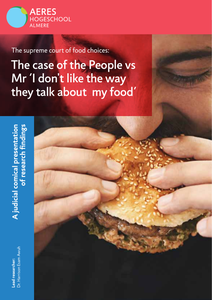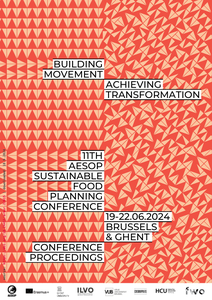This booklet outlines a 'court case' about shaming someone's food choices. Dit boekwerk behandelt een 'rechtszaak' over het te schande maken van iemands voedselkeuzes.
DOCUMENT

The current food environment in The Netherlands is considered obesogenic. Eighty percent of the products in supermarkets are unhealthy. The Wheel of Five is the well-established, science-based Dutch food-based dietary guideline (FBDG) developed to stimulate healthier choices. In addition, simple directions on food packaging, such as front-of-package (FOP) health logos, could also be helpful. However, these tools should be in line with each other, in order not to confuse the consumer. To study this, we evaluated two FOP nutrient profiling systems (NPSs) for their alignment with the Wheel of Five: Choices five-level criteria and Nutri-Score. For this, a small but representative sample of 124 products was selected from the Dutch food composition database (NEVO). For these products, the scores for Choices and Nutri-Score were calculated using the published criteria, whilecompliance with the Wheel of Five was established by using the criteria from Netherlands Nutrition Center (NNC). The Wheel of Five food groups were used to categorize the products. Differences between the Wheel of Five and Choices are smaller than with Nutri-Score, concluding that Choices ismore consistent with the Wheel of Five and might be an attractive alternation for a FOP health logo on the Dutch market.
DOCUMENT

The design of health game rewards for preadolescents Videogames are a promising strategy for child health interventions, but their impact can vary depending on the game mechanics used. This study investigated achievement-based ‘rewards’ and their design among preadolescents (8-12 years) to assess their effect and explain how they work. In a 2 (game reward achievement system: social vs. personal) x 2 (game reward context: in-game vs. out-game) between-subjects design, 178 children were randomly assigned to one of four conditions. Findings indicated that a ‘personal’ achievement system (showing one’s own high scores) led to more attention and less frustration than a ‘social’ achievement system (showing also high scores of others) which, in turn, increased children’s motivation to make healthy food choices. Furthermore, ‘out’-game rewards (tangible stickers allocated outside the game environment) were liked more than ‘in’-game rewards (virtual stickers allocated in the game environment), leading to greater satisfaction and, in turn, a higher motivation to make healthy food choices.
LINK
A global push to reduce the amount of saturated and trans-fatty acids, added salt and sugar in processed food, and to enhance fruit, vegetable and whole grain intake, while limiting energy intake, exists for most populations. Objectives:To redesign the International Choices Program (note: this is unrelated to the US Smart Choices Program), initiallyNetherlands focused, by an international board of scientists to create a generic, global front-of-pack nutrition logo system that helps consumers make healthier food choices and stimulates product reformulation
LINK
In 2008, the Choices International Foundation developed its logo criteria, identifying best-in-class food products. More advanced, global and graded nutrient profiling systems (NPSs) are needed to substantiate different national nutrition policies. The objective of this work was to extend Choices NPS to identify five levels of the healthiness of food products, so that the Choices NPS can also be used to support other nutrition policies, next to front-of-pack labelling. Based on the same principles as the previous logo criteria, four sets of threshold criteria were determined using a combination of compliance levels, calculated from a large international food group-specific database, the Choices logo criteria, and WHO-NPSs developed to restrict marketing to children. Validation consisted of a comparison with indicator foods from food-based dietary guidelines from various countries. Some thresholds were adjusted after the validation, e.g., because intermediate thresholds were too lenient. This resulted in a new international NPS that can be applied to different contexts and to support a variety of health policies, to prevent both undernutrition and obesity. It can efficiently evaluate mixed food products and represents a flexible tool, applicable in various settings and populations.
LINK
MULTIFILE
Citizens living in food poverty can easily get caught up in a vicious cycle. Socio-economically disadvantaged people often rely on food assistance and are more likely to suffer from diseases caused by unhealthy diets, such as diabetes. They may also experience isolation and lack social networks, as they do not have the financial means to participate in social life. Moreover, this group is often overlooked in decision-making processes regarding healthy and sustainable food environments. To create equitable food environments in urban areas, it is crucial to incorporate the everyday challenges and needs of socioeconomically disadvantaged people. In our collaborative research, we explore the needs of socioeconomically disadvantaged people regarding a healthy and sustainable diet in Switzerland and the Netherlands. The aim is also to develop, in a participatory way, ideas on how to create more socially just and inclusive food environments.Keywords: food poverty, food environments, social participation, participatory action research
DOCUMENT

The study hereby presented is part of a major program led by the Wageningen University and Research Centre (WURC), to which alongside the authors’ institutions also the Louis Bolk Institute (LBI) contributed. The overarching aim of the program is to support healthy and sustainable food choices among both employees and customers in health care and hospitality settings. The present study’s aim is to evaluate employees’ awareness of the healthiness of their food choice both at home and out of home, and the reasons behind these choices.
DOCUMENT
Moral food lab: Transforming the food system with crowd-sourced ethics
LINK